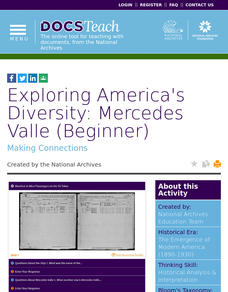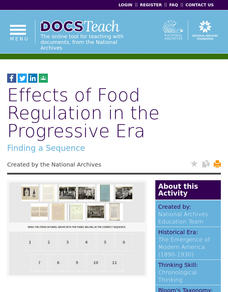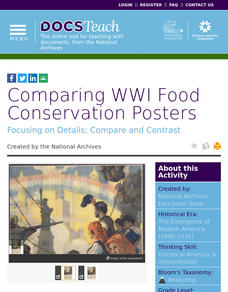DocsTeach
Bibb Mill No 1 Child Labor Photograph Discussion
There's no way a child can operate heavy machinery ... right? Pupils examine a photograph of a child operating a loom at mill to learn about child labor and its impacts. Prompts provoke thoughtful discussion or fuel a writing exercise.
DocsTeach
Americans on the Homefront Helped Win World War I
Saving sugar, growing crops, and not eating meat sound like small things, but they were a huge part of the home front effort during World War I. Photographic evidence of civilian struggles during the war, along with a matching game,...
Smithsonian Institution
Strength in Solidarity: Coalition of Immokalee Workers and the Campaign for Fair Food
Not all food is created equal. The lesson dives into the world of migrant farm workers to show their struggles to earn livable wages and better working conditions. Academics learn why the Coalition of Immokalee Workers was created and...
Smithsonian Institution
Native Resistance: Native Resistance Then and Now
Native Americans lost so much—and gained so little in return. Scholars explore Native Americans' resistance to the United States government. The lesson plan uses primary sources to explore the different forms of protest and gives a voice...
Smithsonian Institution
Fighting For Freedom: The Stono Rebellion and Free Frank McWhorter
Travel back in time to the Stono Rebellion. Young historians research historical figures who played a role in African Americans' fight to escape slavery. Scholars research material, complete handouts, participate in group discussion, and...
Smithsonian Institution
Targeted at Home: Islamophobia
September 11th was a terrible tragedy with long-reaching consequences. Scholars learn about the Islamophobia that occurred to many Muslim Americans following the 9/11 attacks. The resource provides videos, articles, and interviews to...
Smithsonian Institution
Hidden Histories: Mexican Repatriation During the 1930s
Mexican Repatriation: the forgotten deportation of American citizens. The resource focuses on the deportation of Mexican American citizens during the Great Depression. Young historians read documents, complete a free-write, and fill out...
Smithsonian Institution
A Dream Deferred: DACA
"Give us your tired, your poor, your huddled masses" has even more meaning for some children. The resource explores the Deferred Action for Childhood Arrivals (DACA) program. Scholars analyze primary sources and participate in group...
Smithsonian Institution
A New America: The Hart-Celler Immigration Act of 1965
Many dream of coming to America, but few may enter. The instructional activity explores the Hart-Celler Immigration Act of 1965 and how it changed immigration policies in the United States. Academics learn how immigration quotas impacted...
Smithsonian Institution
Us vs. Them: The Chinese Exclusion Act of 1882
Immigration issues are nothing new. An interesting lesson focuses on the racially motivated Chinese Exclusion Act of 1882 and its impact on the Chinese American community. Scholars read articles, analyze political cartoons, and...
Smithsonian Institution
Re-Segregation of American Schools: Re-Segregation
Examine the re-segregation of public schools in a thought-provoking resource. Young scholars read articles and primary sources, complete worksheets, and watch a video to explore the idea that desegregation made schools more segregated....
Smithsonian Institution
Racism and Removal: Japanese Incarceration During World War II
During World War II people saw how far the government's control would go, but it was at the expense of its citizens. The resource brings the conditions of Japanese American internment camps to light using primary documents. Scholars...
Smithsonian Institution
Resistance to School Desegregation: The Boston Busing Crisis
Despite how it sounds, Boston's busing crisis wasn't a transportation problem. Academics address the problems faced by African Americans following school desegregation and the struggle to receive equal educational opportunities. Scholars...
Smithsonian Institution
Separate is Not Equal: Fight for Desegregation
Separate is not equal! An eye-opening lesson delves into the past to understand the fight for desegregation and how it impacted African American communities. Academics complete two one-hour lessons using documents, photographs, and...
Smithsonian Institution
Borders within the United States: Indian Boarding Schools and Assimilation
Native American Nations ... sovereign entities or removable tribes? A thought-provoking instructional activity explores the relationship between Native American tribes and the United States, including forced assimilation and removal from...
Smithsonian Institution
Borders with the World: Mexican-American War and U.S. Southern Borderlands
The Mexican-American War created social borders—not just physical ones. Scholars learn about the effects of the Mexican-American War on the people living in the borderlands using text excerpts, maps, and partnered activities. Academics...
DocsTeach
Inevitable Accident or Wrongful Act: Judging the Titanic Disaster
The unsinkable ship that sunk. Scholars review the case against the White Star Line following the tragic loss of life from the Titanic disaster. Academics read documents and organize them into arguments for and against the cruise line....
DocsTeach
Exploring America's Diversity: Rosalia Fundaro (Beginner)
Elementary scholars learn about the life of Rosalia Fundaro, an Italian immigrant, using primary sources. They analyze documents, complete written prompts, and participate in group discussion to understand Rosalia's life in the United...
DocsTeach
Exploring America's Diversity: Motel Garber (Beginner)
Young detectives delve into the past in an exciting series exploring immigration. The activity uses primary sources to teach elementary scholars historical analysis. Academics read records to understand the life of Motel Garber, from...
DocsTeach
Exploring America's Diversity: Mercedes Valle (Beginner)
An enlightening activity focuses on the life of Mercedes Valle, an immigrant from Ecuador. Scholars analyze ships and census records to understand the life of Mercedes Valle. In addition, they participate in a group discussion and...
DocsTeach
Exploring America's Diversity: Luther Powell (Beginner)
Luther Powell immigrated to the United States to live the American dream—and create a better life for his son, four-star general Colin Powell. Elementary academics look at documents, such as, ship records to understand the immigration...
DocsTeach
Environmental Case Study: Hetch Hetchy Valley
What is more important: building a new school or preserving a nature reserve? Keeping a natural area clean or providing clean drinking water to a city of millions? Young scholars weigh these questions—almost literally—using an...
DocsTeach
Effects of Food Regulation in the Progressive Era
Moldy canned goods, exploding ketchup, and filthy conditions: These were some of the issues the reformers of the Progressive Era targeted with legislation such as the Pure Food and Drug Act. Using images of food factories and documents...
DocsTeach
Comparing WWI Food Conservation Posters
Food will win the war! At least, that is what some World War I-era posters say. Using two propaganda posters—one in English and one in Yiddish—young scholars consider why the Wilson administration had the posters created. Discussion...

























